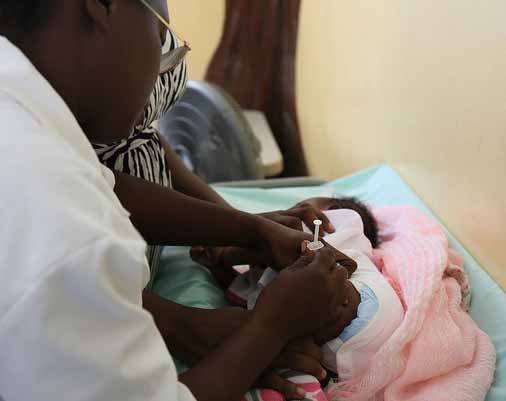$128 million from Gates to reduce infant mortality

The Bill & Melinda Gates Foundation announced grants totaling US$128 million to support the development and accessibility of maternal vaccines for Group B Streptococcus (GBS) and Respiratory Syncytial Virus (RSV), two of the leading causes of death for newborns and young infants in lower-income countries.
No vaccines currently exist for these infections and treatment is too often out of reach in lower-income settings. These vaccines are being developed by Pfizer and, if successful and approved, would represent a significant advancement in the maternal immunization space. The GBS vaccine candidate could also be the first vaccine developed with a primary purpose for use during pregnancy to prevent infections in newborns and young infants. The foundation grants will fund work to help ensure the vaccines are accessible to pregnant women living in lower-income countries.
Child deaths have been reduced by more than 60% since 1990, due in large part to vaccines. However, more than 45% of all deaths in children under age 5 occur within the first four weeks of life and the vast majority of those happen in low- and middle-income countries.
“Maternal immunization—vaccinating pregnant women who can then pass on lifesaving protection to their babies—is a powerful way to reduce newborn and infant mortality,” said Keith Klugman, director, pneumonia at the Bill & Melinda Gates Foundation. “However, for decades, innovation in this area has been underprioritized and underfunded, putting babies unnecessarily at risk for preventable infections. We are hopeful our investments in this promising pipeline of new maternal vaccines, including these two grants, will help infants in low-income settings have the best chance at life.”
Vaccines used during pregnancy have been proven to be safe and effective. For example, vaccines are 95% effective at preventing infant deaths from whooping cough and, along with other interventions, have reduced tetanus-related deaths in infants by 88%. Successful development and increased access to vaccines for GBS and RSV could contribute towards the global goal of ending preventable deaths in newborns and children under 5 years old by 2030.
“If successful and approved or licensed, Pfizer’s vaccine candidates against GBS and RSV could have a profound impact on the health of young infants at a time when they are most vulnerable against these potentially devastating infections, particularly in lower-income countries where prevalence is higher,” said Annaliesa Anderson, Ph.D., senior vice president and chief scientific officer, vaccine research and development, Pfizer. “As part of Pfizer’s Accord for a Healthier World program focused on establishing access to our medicines and vaccines on a not-for-profit basis, the support for the vaccine candidates from the Gates Foundation will enable faster and more equitable deployment of the vaccines to these regions.”
GBS strikes immediately before birth or in the first three months of life. RSV is most serious in infants in the first six months of life. Both infections affect vulnerable young infants before they have developed mature immune systems that can fight off life-threatening infections. For this reason, vaccines for GBS and RSV are being developed to immunize the mother so that she can transfer protective antibodies to her baby before birth. GBS and RSV are particularly devastating in lower-income countries where access to timely and effective medical care can be a challenge.
GBS is estimated to cause at least 90,000 newborn deaths and 46,000 stillbirths each year, with sub-Saharan Africa accounting for more than half of those deaths. RSV causes at least 100,000 infant deaths per year globally with 97% of the burden falling on low-and middle-income countries.
“As a researcher and pediatrician, I have seen the impact maternal immunization has had in reducing infant mortality in low-income countries,” said Shabir Madhi, director of the SAMRC Vaccines and Infectious Diseases Analytics Research Unit, University of the Witwatersrand. “Without multisectoral collaborations like these, advancement of vaccines that could help end preventable newborn and early-infant deaths in low- and middle-income countries simply would not happen.”
A $100 million grant will support the manufacturing of Pfizer’s GBS vaccine for Phase 3 clinical trials and, if successful, World Health Organization prequalification. It will also help fund the development of an affordable multidose vial for delivery of the vaccine in lower-income countries via public-sector purchasers, including Gavi, the Vaccine Alliance. This grant builds on a previous foundation investment for $17 million to help support Pfizer’s Phase 1/2 clinical trials that are exploring if protective antibodies could be transferred from immunized mothers to their babies.
A $27.5 million grant to Pfizer will support the development of an affordable multidose vial for delivery of the RSV vaccine candidate in lower-income countries via public sector purchasers, including Gavi. The work is co-funded by Pfizer and will include feasibility studies, clinical trial material manufacturing, and a trial to confirm that the multidose vial packaging designed for use in lower-income countries is comparable with what is used in high-income country markets.
Both grants are anchored in the principles of the Gates Foundation’s Global Access Policy, which ensures that knowledge generated from these efforts can be promptly and broadly disseminated and any resulting products be made available and accessible at an affordable price to the world’s poorest.
The Gates Foundation has committed nearly $540 million to maternal immunization efforts over the last 15 years, with an approach that focuses on evidence generation, product development and implementation. In addition to funding research and development for GBS and RSV, the foundation has supported the advancement of other maternal vaccines to prevent influenza, whooping cough and newborn bloodstream infections caused by bacteria other than GBS. Through foundation support and the collaboration of partners and grantees around the world, there’s hope that more women and their babies in lower-income countries will have access to lifesaving tools that can protect against key vaccine-preventable diseases.

